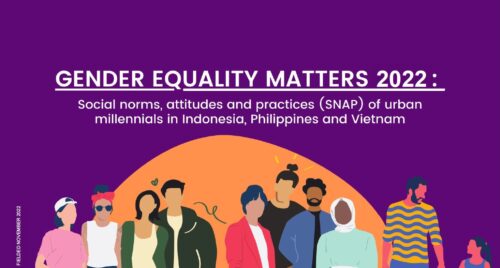Gender Equality Matters 2022: Social Norms, Attitudes, and Practices (SNAP)
Summary
This report provides a comprehensive analysis of urban millennials’ attitudes and behaviors towards gender norms in Indonesia, the Philippines, and Vietnam, gathered from the Social Norms, Attitudes, and Practices Survey (SNAPS) 2022. It builds upon data already gathered in the SNAP 2018 and 2020 Surveys and adds specific areas of enquiry according to the following norms:
- Norm 1 – Childcare and Housework: Women’s primary role perceived as career for children and family members, home maker
- Norm 2 – Breadwinning and Family Income: Men’s perceived role as primary income earner/ provider for the family
- Norm 3 – Job segregation: Perceptions that certain job types are more suitable for women and others for men, leading to occupational segregation
- Norm 4 – Leadership: Perceptions of women as better in supportive roles and men as better leaders
Using statistical significance testing, regression analysis and segmentation analysis, the report delves into shifts in gender norms around childcare, breadwinning, job segregation, and leadership. Findings suggest that social observations, media portrayals and childhood experiences significantly impact millennials’ gender norms.The report underscores the critical role of visible equality in social circles and media in fostering gender-equitable behaviours and attitudes.
Highlights
- The regression analysis found that social observations matter to urban millennials; particularly, what they see in their social circles, what the witness in their parents growing up, and what they watch on the media. If urban millennials in Indonesia, the Philippines and Vietnam are going to embrace gender equality, they will need to see embracing gender equality, too.
- Also observed from 2020 to 2022 are how gender equality at home is on the rise, promising shifts in parental modeling, and leadership and job segregation behavior trending stable of more equal.
- The segmentation analysis identified areas of positive deviance within traditional segments, namely on caregiving, breadwinning, and leadership. The segmentation analysis also showed that compared to men, women are more likely to show progressive attitudes.
View other SNAP survey reports:
Download Resources Here


